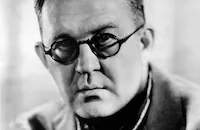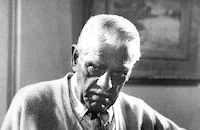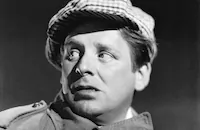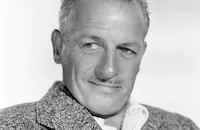The Lost Patrol

Brief Synopsis
Cast & Crew
John Ford
Victor Mclaglen
Boris Karloff
Wallace Ford
Reginald Denny
J. M. Kerrigan
Film Details
Technical Specs

Synopsis
In Mesopotamia during World War I, the leader of a British desert patrol is killed by an unseen Arab sniper. After the sergeant takes over command, the patrol begins a torturous journey across the sands, which takes a toll on both men and horses. Then, as the soldiers near total collapse, soldier Morelli spots an oasis in the distance. The sergeant, who has confessed to Morelli that he never received orders as to the patrol's exact mission, leads his men to the oasis, where they revel in the shade and drink from the plentiful water supply. The next morning, however, the men discover Pearson, a fresh-faced, eager recruit who was assigned to the night watch, slain, Corporal Bell seriously wounded, and all of the horses stolen. After the group discusses their options, veteran soldier Hale climbs a palm tree to survey the area and is shot down by a sniper. Sure that they will not survive while traveling as a group, the sergeant orders everyone but Sanders, a religious fanatic who is going insane, to draw straws to determine who will go for help. Jock MacKay makes the unlucky selection and picks Matlow Cook to accompany him. Later Abelson, succumbing to the effects of the desert sun, stumbles away from the oasis and is shot by a sniper. In spite of Morelli's heroic rescue, Abelson dies from his wound. Determined to retaliate, the soldiers open fire on the Arabs, and two men, Quincannon and Corporal Bell, are killed. The next day, while scanning the horizon, the sergeant sees two figures riding toward the oasis and orders them shot. When they reach the fallen men and horses, however, they find the slaughtered, mutiliated bodies of MacKay and Cook. After Sanders forcibly berates and threatens Morelli, a former music hall performer, for his "sins," the sergeant learns that George Brown, a "gentleman soldier," slipped away during the night to avenge his comrades' deaths. Now only three, the survivors are spotted from the air by a British aviator. As the pilot descends from his plane, however, he is killed by the snipers, and his death causes Sanders to fly into a deranged rage. Morelli and the sergeant tie up Sanders, then set the plane on fire to alert any passing troops of their whereabouts. As hoped, the fire attracts the attention of another patrol, which alters its course toward the oasis. Before the other unit arrives, however, Sanders escapes and, while carrying a hand-fashioned cross, strides toward the snipers. In spite of his hatred for Sanders, Morelli rushes after him, but both men are brought down by the snipers. Alone, a dazed sergeant kills several Arabs who try to claim the oasis, and is finally rescued by his fellow British soldiers.

Director

John Ford
Cast

Victor Mclaglen

Boris Karloff

Wallace Ford

Reginald Denny

J. M. Kerrigan

Billy Bevan
Sammy Stein

Alan Hale

Douglas Walton

Brandon Hurst
Paul Hanson
Howard Wilson
Neville Clark
Crew
Major Frank Baker
Merian C. Cooper
P. J. Faulkner
John Ford
Garrett Fort
Argyle Nelson
Dudley Nichols
Van Nest Polglase
Clem Portman
Cliff Reid
L. Shapiro
Murray Spivack
Max Steiner
Sidney Ullman
Vernon Walker
Paul Weatherwax
Harold Wenstrom

Photo Collections
Videos
Movie Clip



Hosted Intro
Film Details
Technical Specs

Award Nominations
Best Score
Articles
The Lost Patrol
The film opens with a patrol of British cavalrymen riding through the Mesopotamian Desert. The one officer who is familiar with their mission is shot by a sniper, leaving the men stranded with no orders and no real knowledge of where they are. A hardened sergeant (Victor McLaglen) takes command of the unit, although all he's able to do is lead them to an oasis, where the men are shot down, one after another, by unseen riflemen. Eventually, only the sergeant, a man named Morelli (Wallace Ford), and a religious fanatic named Sanders (Boris Karloff) are left to ponder their fates. The situation finally drives Sanders insane.
Critics have alternately hailed The Lost Patrol as a flawed masterpiece and a failed experiment. In reality, it's probably a little bit of both. Certainly, there's an ethereal quality to the picture that sticks with you long after it's over. And Karloff's transformation into a wild-eyed Christ figure casts a bizarre spell, even though his over-the-top histrionics seems geared for a silent film, not a talkie. But it may be the elusive metaphor of a group of leaderless soldiers being picked off by an enemy they can't even see that breeds the most fascination. Different viewers will read different meanings into the sparse narrative.
. Even at such an early point in movie history, this wasn't the first time Philip MacDonald's novel, Patrol, had been adapted for the screen. In fact, a 1929 British version starred Cyril McLaglen, Victor's brother, as the Sergeant! Ford and his screenwriting partner, Dudley Nichols, attempted to add some depth by giving the soldiers an opportunity to sound off about their personal histories before taking their bullets, an approach that works better with some characters than with others.
This was the first collaboration between Ford and Nichols, who would later team up on such legendary films as The Informer (1935), Stagecoach (1939), and The Long Voyage Home (1940). "I was working at Fox again," Nichols later remembered, "when Ford, who had gone to RKO to make a modest film from Philip MacDonald's war novel, Patrol, called me, in some urgency. He was to start shooting in about ten days - and had no script. What had been done, he considered a mess and unshootable." Nichols and Ford sat down and pounded out a new script in eight days, then the picture was filmed in ten days, in the desert around Yuma Arizona.
The heat in the desert was unbearable, sometimes reaching upwards of 120 degrees. This led to one of those stories that Ford loved to tell about foolish producers who didn't know what they were dealing with. This one involved a pampered type who ruined an important shot by landing his plane too close to the location. Ford was livid when the horses scattered and left unwanted hoof-prints all over the dunes. The producer then approached Ford and suggested that the cast and crew should start taking shorter breaks to speed up filming. "But you can't work in the heat," Ford said. "Jack," the producer said, "it's great. I've never felt so good in my life." He then proceeded to enthusiastically stroll around the set, bare-headed and puffing his cigar. About an hour later, Ford, needed to confer with the producer- but he was already in the hospital with sunstroke.
Director: John Ford
Producer: Cliff Reid
Screenplay: Dudley Nichols (based on the novel Patrol by Philip MacDonald)
Cinematography: Harold Wenstrom
Editor: Paul Weatherwax
Music: Max Steiner
Art Designer: Van Nest Polglase and Sidney Ullman
Cast: Victor McLaglen (The Sergeant), Boris Karloff (Sanders), Wallace Ford (Morelli), Reginald Denny (George Brown), J.M. Kerrigan (Quincannon), Billy Bevan (Herbert Hale), Alan Hale (Cook), Brandon Hurst (Bell), Douglas Walton (Pearson), Sammy Stein (Abelson), Howard Wilson (Aviator), Neville Clark (Lt. Hawkins), Paul Hanson (Jock Mackay).
B&W-66m. Closed captioning.
by Paul Tatara

The Lost Patrol
Quotes
Trivia
Notes
The working title of this film was Patrol. News items state that Richard Dix was originally slated to star in the picture, but was reassigned to Stingaree before production began. Major Frank Baker, who was hired by producer Cliff Reid as a technical advisor, was a British army veteran of the Mesopotamia and Palestine campaigns. Desert scenes for the film were shot in Yuma, AZ. According to a Hollywood Reporter news item, the production unit encountered much difficulty during shooting, being plagued by dysentery, bad water and excessive heat. Max Steiner was nominated for an Academy Award for Best Musical Score, but lost to Louis Silver, who won for his work on Columbia's One Night of Love.
According to an autobiographical article that appeared in the 1983 Variety anniversary issue, Jerry Webb was the script supervisor on the film. Webb describes one day of the filming: "A hundred yard track had been built over the dunes. The specially constructed dolly, with four rubbertined auto wheels, held the camera, its large sound blimp, the sound boom, lights, reflectors and necessary personnel to photograph the scene. With the full patrol on horseback moving along, about a dozen grips pushed the heavy dolly to allow the camera and sound to record the long scene. The morning heated up more quickly than usual and the temperature hit close to 130 degrees." According to Webb, many of the scenes were shot silent, with sound added in post-production.
Modern sources add the following information about the production: Ford, who had bought the screen rights to Philip MacDonald's book some time before he started directing at RKO, worked with other screenwriters on the adaptation before turning to Nichols, who had served in the Navy during World War I. Ford and Nichols, starting fresh from the novel, wrote the screenplay in eight days, two days before shooting was to begin. Location shooting in Yuma took two weeks. At one point during the difficult filming, actor Wallace Ford was rumored to have chased the company cook across the dunes because he refused to serve a black man. While portraying one of the sergeant's Arab victims, Frank Baker charged McLaglen, who was drunk at the time, for firing live ammunition at his feet during his scene, unaware that Ford had placed a second, sober marksman behind the actor. Composer Steiner added his score after the producers viewed the cut film and decided that, because of the many protracted silent scenes, the entire picture needed music. In spite of the gloomy nature of the story, The Lost Patrol was a modest hit, and its success encouraged RKO to allow Ford and Nichols to make The Informer. Modern sources add Francis Ford to the cast.
According to a late February 1934 Film Daily news item, a "special dramatization" of The Lost Patrol was broadcast on Borden's "45 Minutes in Hollywood" radio program. In 1929, British International produced and Walter Summers directed a silent version of MacDonald's story, which starred Victor McLaglen's brother Cyril in the role of the sergeant.

Miscellaneous Notes
Released in United States 1934
Film took two weeks to shoot in 1934.
Released in United States 1934














